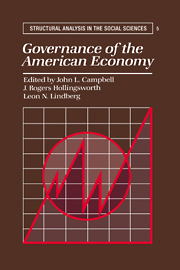Book contents
- Frontmatter
- Contents
- List of figures
- List of tables
- List of contributors
- Preface
- I Conceptual and historical foundations
- II Empirical studies of governance transformations in the United States
- 3 Transformations in the governance of the American telecommunications industry
- 4 Contradictions of governance in the nuclear energy sector
- 5 The statist evolution of rail governance in the United States, 1830–1986
- 6 Governance of the steel industry: What caused the disintegration of the oligopoly?
- 7 Governance of the automobile industry: The transformation of labor and supplier relations
- 8 The dairy industry: From yeomanry to the institutionalization of multilateral governance
- 9 Economic governance and the American meatpacking industry
- 10 The invisible hand in healthcare: the rise of financial markets in the U.S. hospital industry
- III Theoretical evaluation of the empirical cases
- References
- Index
3 - Transformations in the governance of the American telecommunications industry
Published online by Cambridge University Press: 21 March 2010
- Frontmatter
- Contents
- List of figures
- List of tables
- List of contributors
- Preface
- I Conceptual and historical foundations
- II Empirical studies of governance transformations in the United States
- 3 Transformations in the governance of the American telecommunications industry
- 4 Contradictions of governance in the nuclear energy sector
- 5 The statist evolution of rail governance in the United States, 1830–1986
- 6 Governance of the steel industry: What caused the disintegration of the oligopoly?
- 7 Governance of the automobile industry: The transformation of labor and supplier relations
- 8 The dairy industry: From yeomanry to the institutionalization of multilateral governance
- 9 Economic governance and the American meatpacking industry
- 10 The invisible hand in healthcare: the rise of financial markets in the U.S. hospital industry
- III Theoretical evaluation of the empirical cases
- References
- Index
Summary
As many commentators have noted, public policy in the United States traditionally has favored a market-oriented economic system (Fainsod, Gordon, and Palamountain 1959; Hurst 1982). Market competition, however, has proven to be an unstable mechanism for coordinating interactions in the telecommunications industry. From the time of the telegraph and later the telephone, the telecommunications industry has been at the center of efforts to institute nonmarket governance arrangements. Nonmarket alternatives that have been adopted include obligational networks, promotional networks, and hierarchical controls.
The recent court-ordered breakup of the Bell System marks an effort to reintroduce markets as a primary means of governing transactions in the industry. It is still too soon to know if this experiment will prove successful. Nevertheless, the controversies surrounding the current attempt to institute market coordination are revealing. The experimentation with alternative governance regimes over the past 150 years makes this industry a useful laboratory to study the evolution of governance.
The model employed here for analyzing the evolution of governance builds on the framework presented in Chapter 1. In schematic form, this framework posited that transformations from one governance regime to another occur when a governance regime experiences pressures for change, which, in turn, spark a search process for a more adequate regime. As before, it is assumed here that actors search opportunistically for governance regimes that are advantageous to their interests (Williamson 1985).
- Type
- Chapter
- Information
- Governance of the American Economy , pp. 77 - 107Publisher: Cambridge University PressPrint publication year: 1991
- 6
- Cited by



